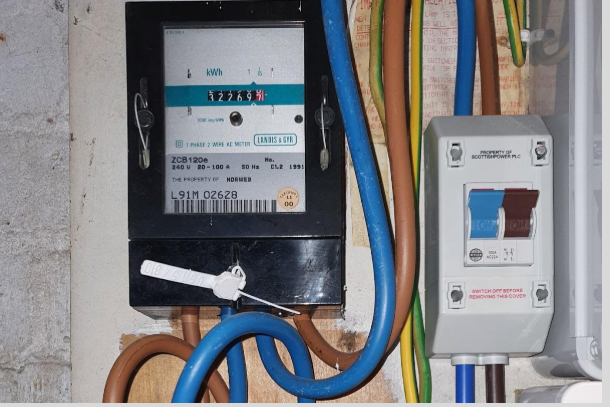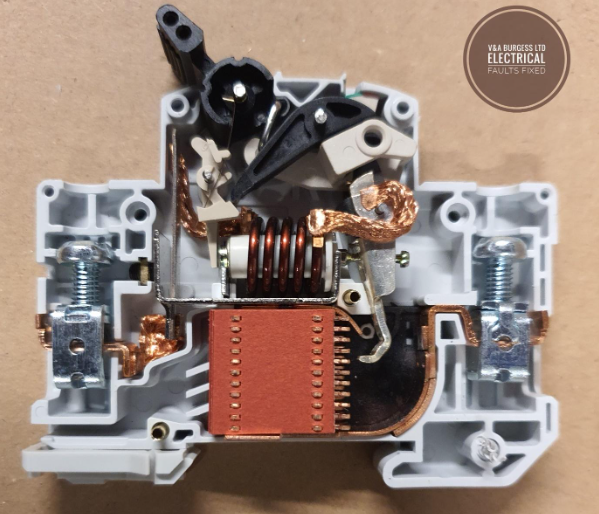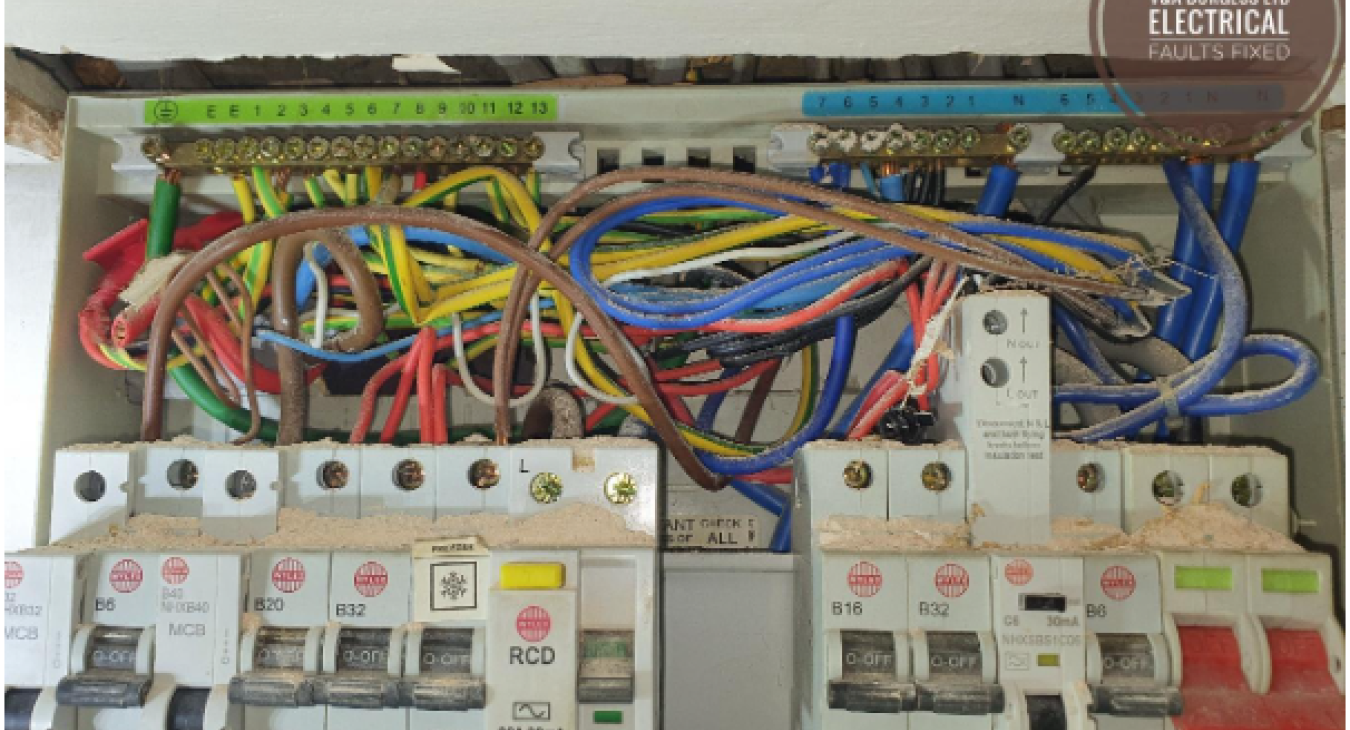Water leaking into Electrical Panel or Fuse Box - Electrical Faults Fixed
Table of Contents
- Introduction
- Water has gone into my fuse box HELP!
- Why does water enter a fuse box?
- Can water in an electrical box cause a fire?
- Damage caused by water in fuse boxes
- Should a wet fuse box be replaced?
- What are the financial costs of a wet fuse box?
- How can water ingress be prevented?
- Is there a risk of Electric Shock?
- Conclusion
1) Introduction
A water leak in a property can cause incredible damage to not only the plasterwork, decorative finishes, and floorings but also to the electrical system. In particular, water intrusion to the fuse panel, consumer unit or fuse box is likely to result in electrical problems ranging from damage to the fuse box components to short circuits within the internal wiring.
Back to top2) Water has gone into my fuse box HELP!
Try not to panic. If you have WATER IN THE FUSE BOX, the first step is not to touch the fuse box. If you can safely shut the power OFF to the fuse box from a different location then do so quickly. In some properties, there is a Main Switch OUTSIDE the fuse box area. This can typically be found in the meter cupboard in more modern homes. The Mains Isolator looks like the photograph below and should be shut off unless it is also wet!
We can see the electricity meter on the left and the Mains Isolator switch on the right.

(PHOTO: Electricity Meter and Main Switch Isolator)
Back to top3) Why does water enter a fuse box?
One of the most common reasons for WATER IN THE FUSE BOX is faulty plumbing. Slow leaks and major leaks alike can result in water dripping into the fuse box. Anything from a drop of water to a complete flood can occur when plumbing goes wrong. On occasion, heavy rains can also cause rain water to enter a fuse box or electrical panel. Water can make its way into a property through the roof, cavity walls or other means and find its way into the electrical system causing electrical issues.
Another common cause of water entering a fuse box is poor installation. Installation locations should be chosen carefully for consumer units and fuse boxes. Installing new electrical equipment in a position that is likely to suffer from water ingress from burst pipes, joins in plumbing, splashes from sinks or in bathroom locations can cause problems. Whilst these installation locations are not necessarily prohibited, there needs to be careful consideration from the designer of the electrical system and the installer to ensure that no reasonably foreseeable harm will come to the electrical system.
Back to top4) Can water in an electrical box cause a fire?
Small drops of water can cause a few problems for sure, but when too much water enters the top of the box and floods through, there is likely to be severe water damage and a risk of electrical fire. If internal cables short out or cause the main switch (to short out, then there can be a real risk of fire.
Back to top5) Damage caused by water in fuse boxes
Aside from the immediate risks and hazards associated with electrical fires and short circuits, when water enters a fuse box it will find its way into all the trip switches and overcurrent protective devices inside the consumer unit, fuse box or electrical panel box.
Trip switches and protective devices have many metal parts which are susceptible to damage from water. No manufacturer ever designed their products to take a good soaking and continue to function normally! Once metal parts inside these devices have been subject to water ingress, they are likely to being to corrode and rust rather quickly. This corrosion will no doubt affect their ability to operate safely!

(Photo: Inside a Circuit Breaker Trip Switch showing metal parts)
Back to top6) Should a wet fuse box be replaced?
Almost certainly yes. If your fuse box has been subject to a reasonable amount of water ingress, it should, as a minimum be subject to an electrical inspection by a qualified electrician and have its internal components replaced. An entirely new fuse box may be necessary to prevent future problems and to ensure safety. Water and electricity are a dangerous combination and should be avoided at all costs. If water has entered electrical components then it can take some time to fully dry out before the real extent of the damage can be assessed by a professional.
Back to top7) What are the financial costs of a wet fuse box?
The most obvious costs for a wet fuse box will be the labour and material costs for its complete replacement. There could be associated costs with upgrading the equipment to the latest safety standards which is often a requirement when replacing an electrical panel, fuse box or consumer unit. There are also various electrical concerns that may need addressing and the costs examining such as:
- Water ingress into cabling
- Water damage to sockets, switches, and other accessories
- The costs of decorative works following electrical works
8) How can water ingress be prevented?
There are a number of items that we should look at to prevent water ingress into our properties and electrical systems.
Roof condition
Have the roof checked out at regular intervals to prevent water ingress into your property. The relatively low cost of minor repairs to a roof can save thousands later on when considering the costs of plastering, structural, electrical, and decorative damages following water ingress. That is of course, not to mention the costs of damage to personal belongings and temporary accommodation.
Plumbing Maintenance
Have your waste water systems, heating systems and pipework checked out by a plumber on occasion to ensure that there are no issues present. Whilst no one can give an absolute guarantee, a plumber may be able to estimate the age of your systems and give a rough idea on when plumbing should be replaced.
Seals around windows and doors
Check that the condition of your doors and windows is such that no water can enter through cracks, seals, or gaps anywhere. Have repairs carried out when required and make sure that any damage is dealt with quickly.
Back to top9) Is there a risk of Electric Shock?
There is very likely a risk of electrical shock when water enters a fuse box. Water can pool at the bottom of the fuse box touching the live parts and result in metalwork becoming live throughout your home. Where water has entered the fuse box, consumer unit, electrical panel or in fact, any electrical equipment, the area should be avoided.
Try to find a safe point of power isolation to stop the supply to the wet equipment. If you are at all unsure then contact an Emergency Electrician immediately who may be able to help. If there is sparking, burning or damaged equipment then contact the fire department for advice.
Back to top10) Conclusion
Avoiding water ingress into a fuse box is the best way of preventing serious electrical damage in the first place but once water has affected the panel, its best to have a professional electrician check things out for you.
The panel or fuse box is likely to be damaged beyond repair and will likely need replacement or extensive repair. The costs can vary for a fuse box replacement
Back to top
Read more articles
- Log in to post comments


